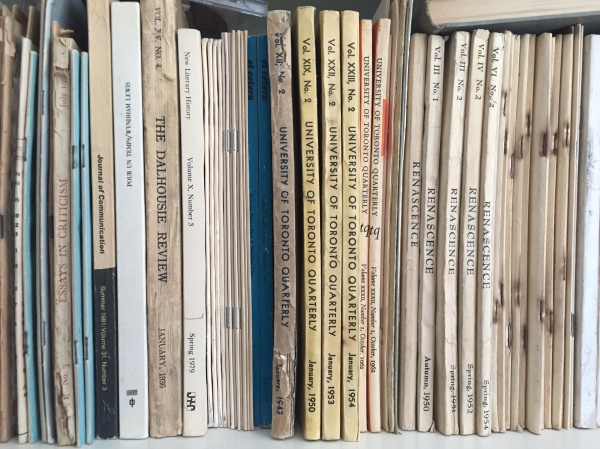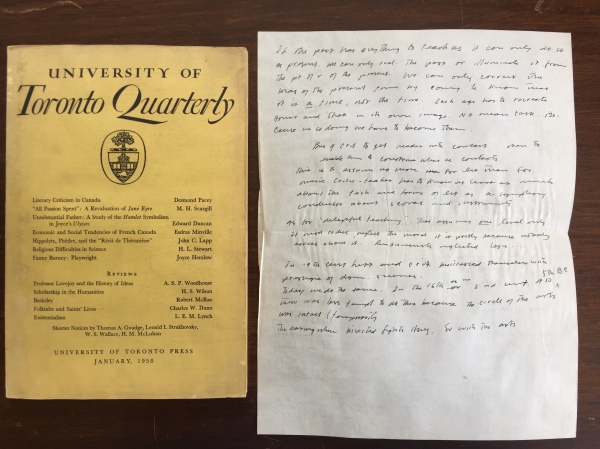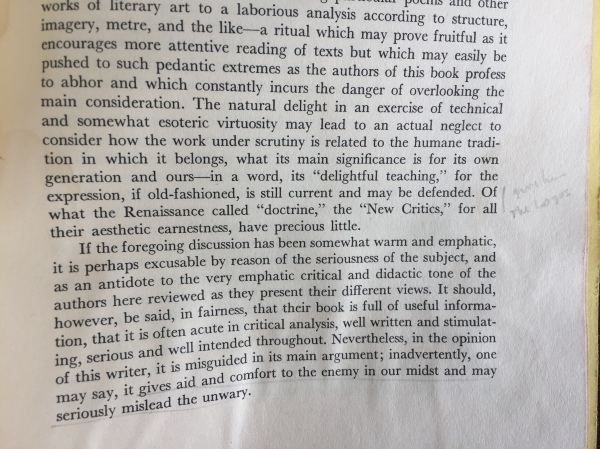‘The earwig when bisected fights itself’

Dear reader,
“If the past has anything to teach us it can only do so as the present. We can only evaluate the past or illuminate it from the point of view of the present. We can only correct the true bias of the present time by coming to know that time as A time, not THE time. Each age has to recreate Homer and Shakespeare in its own image. This is no mean task, because in doing so we have to become them.

So reads a page written by Marshall McLuhan and tucked into his copy of the University of Toronto Quarterly from January 1950, which rests in the library of Eric McLuhan. This issue contains a review by H. M. McLuhan (Marshall wouldn’t drop the ‘H.’ for a few years yet) of “‘Essays in Criticism, 1920-1948: Representing the Achievement Modern British and American Critics,’ Selected by Robert Wooster Stallman. With a Foreword by Cleanth Brooks” at the end of the journal.
I should say the above is my transcript which a few embellishments to make it flow. I am confident of my transcript except for a few spots in the second-last paragraph, where I have made vague suggestions for 2/3 cases.
The start of the above note seems to echo, or begin from, the close of Marshall’s review, which reads:
“If the present is inevitably the only door to ANY past, it should be plain from these essays that it is today possible to apprehend our literature from Langland to Eliot with a variety of grasp and relevance of effect that will establish its position as a university discipline in new and impressive ways.”
In the third paragraph, Marshall refers to “delightful teaching,” which would seem to be a reference to a review in this issue ‘Scholarship in the Humanities,’ by H. S. Wilson, a review of ‘Theory in Literature’ by René Wellek and Austin Warren. Marshall makes a margin note beside this part of a paragraph:

“There is another fashion prevalent among some contemporary critics and teachers, of which the present book takes extended and eulogistic notice, a fashion of submitting particular poems and other works of literary art to a laborious analysis according to structure, imagery, metre, and the like–a ritual which may prove fruitful as it encourages more attentive reading of texts but which may easily be pushed to such
pedantic extremes as the authors of this book profess to abhor and which constantly incurs the danger of overlooking the main consideration. The natural delight in an exercise of technical and somewhat esoteric virtuosity may lead to an actual neglect to consider how to work under scrutiny is related to the humane tradition in which it belongs, what its main significance is for its own generation and ours–in a word, its “delightful teaching,” for the expression, if old-fashioned is still current and may be defended. Of what the Renaissance called “doctrine,” the “New Critics.” for all their aesthetic earnestness, have precious little.”My guess is that these notes were made by Marshall McLuhan when he received his copy of this journal in early 1950 – the handwriting is consistent with that period, and the reference to and comment on Wilson’s piece would tend to confirm it.
It struck me because of the last note ‘the earwig when bisected fights itself. So with the arts.’
Yours,
Andrew McLuhan